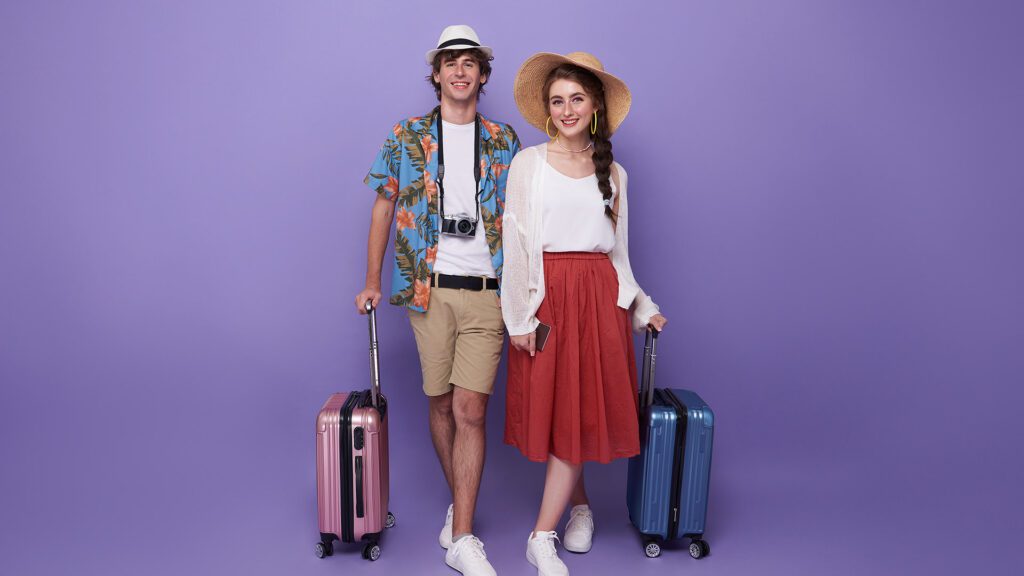As the travel and tourism industry looks toward 2024, there is a sense of anticipation in the air for what lies ahead. With more and more countries beginning to relax restrictions on travel, tourists are eagerly seeking new opportunities to explore exciting destinations around the world. As this shift occurs, it is important to be aware of the emerging trends in the industry.
A recent study revealed that travelers are becoming increasingly looking for sustainable options when visiting foreign destinations and expect tour operators to offer experiences with minimal environmental impact.
Today travelers are expected to prefer guided tours during their trips to different destinations instead of self-guided trips as they seek personalised experiences from local experts familiar with each destination.
Modern technologies such as contactless payment solutions will become even more prominent with tourists expecting tour companies to be well equipped with these tools. With knowledge of these emerging trends, tour and activity operators will be able to successfully adapt their business strategies moving forward.
In this blog we look at the global travel and tourism statistics to better understand the current state of the industry.
Top Travel and Tourism Statistics
In 2020, the number of international travel arrivals decreased by 73% due to COVID-19 related domestic and international travel and restrictions. Despite this decrease, it is expected that by 2024 the total number of international tourist arrivals will reach 1.8 billion.
The US remains in first place for most visited countries with a total of 80 million international tourists in 2020. France was in second place with 75 million, followed by Spain with 66 million, China with 58 million and Italy with 51 million.
The top leisure activities for travelers include sightseeing (70%), shopping (47%), beach time (31%) and visiting family attending cultural events (30%).
The most popular destinations for business travel are the US, the UK, France and Germany.
Travel Trends Among Different Age Groups
Travel Enthusiasm by Age Group
Travelers aged 18-34 exhibit the highest inclination to plan extravagant trips, with 80% of them expressing this preference. In contrast, only 56% of travelers aged over 50 share a similar penchant for grandeur, according to Expedia.
Generational Travel Trends
Generational disparities in travel behavior emerge as travelers over 40 predominantly opt for journeys with significant others or multiple other generations of family. Conversely, travelers under 40 tend to gravitate towards group travel with friends or embarking on solo adventures, as indicated by Evolve’s findings.
Gen X travelers, balancing career and family commitments, often look for the best deals for travel costs when booking trips and prefer destinations that offer a mix of relaxation and activities.
Instagram-Worthy Destination Selection
Approximately 40% of Millennials choose their holiday travel destinations based on the potential for capturing Instagram-worthy photos. This underscores the influence of visual aesthetics on Millennials’ travel choices, according to passport-photo.online.
Influencer Trust Among Gen Zers
A notable 45% of Gen Zers place their trust in travel recommendations from influencers. This statistic highlights the significant role that influencers play in shaping the preferences of the Gen Z demographic, as reported by passport-photo.online.
Culinary Scene Influence on Gen Z and Millennials (Travelmarketreport):
The quality of the culinary scene plays a substantial role in travel decisions for both Gen Z and Millennials. A majority, 61% of Millennials, and 56% of Gen Zs, acknowledge being influenced by the culinary offerings when selecting their accommodation in a destination, as noted in Travelmarketreport.
Influence of Celebrities and Digital Content Creators (Travelmarketreport):
A considerable 38% of Millennials reveal that celebrities and digital content creators wield significant influence over their travel choices. This signifies the impact of celebrity endorsements and content creator recommendations on Millennial travel decisions, as reported by Travelmarketreport.
Travel Purchases Based on Celebrity and Influencer Posts (Travelmarketreport):
An impressive 57% of Millennials have made travel purchases influenced, at least in part, by posts from celebrities or influencers. This statistic underscores the persuasive power of celebrity and influencer endorsements on Millennials’ travel and spending habits, as highlighted in Travelmarketreport’s research.
Age Group Travel Preferences
Travel preferences vary significantly across different age groups, shaping the tourism industry’s offerings. Baby boomers, for instance, often prioritize relaxation and leisure activities, seeking serene environments to unwind. In contrast, Gen Z travelers are more inclined towards adventure and unique experiences, constantly on the lookout for the next thrill. Millennials, meanwhile, show a strong interest in cultural and historical experiences, eager to immerse themselves in the local heritage and traditions of their destinations. Understanding these diverse age demographic group travel preferences is crucial for the tourism industry to tailor its services and products effectively, ensuring each age group finds their ideal travel experience.
Travel Spending Statistics
Worldwide, travelers are projected to spend a total of $1.7 trillion on international tourism by 2024. This figure is projected to reach $2.4 trillion by 2025.
In 2020, travel spending was down significantly with an estimated loss of over $770 billion due to the COVID-19 pandemic. This is a decrease of more than 53% compared to 2019. Full recovery of the travel industry is expected by 2026.
The US continues to be the largest travel market in the world, representing nearly one-third of global travel spending in 2020. The UK ($135 billion) and China ($126 billion) follow in second and third place respectively.
Online Travel Agencies Statistics
With the shift towards digitalisation, online travel bookings are becoming increasingly popular. In 2020, 43% of travelers used online travel agencies (OTA) to book their trips.
The top 3 OTAs are Booking.com, Expedia and Travco, accounting for over half of the global online travel market in 2020.
Advanced Booking Trends
In a notable shift from 2020 and 2021, 59% of travelers are now planning their trips with a lead time of 2-5 months. This represents a departure from the previous trend of booking less than four to five trips more than 2 months in advance, as observed by Evolve.
Travel Plans for 2023
A substantial 62% of travelers have intentions to embark on 3 or more trips in the year 2023, according to Evolve’s findings.
Cart Abandonment Rates
The rate of shoppers abandoning their travel purchases stands at 85% for desktop users and 91% for those making purchases on mobile devices, based on SalesCycle’s data.
Mobile Booking Surge Following Google Searches
Approximately 72% of mobile bookings occur within the 48 hours following Google searches containing the terms ‘tonight’ and ‘today,’ as reported by StratosJets.
Shift in Online Booking Platforms
In 2022, there was a noticeable shift in online booking platform preferences. Notably, 64% of online purchases were made on desktops, while 44% occurred on mobile devices. This reflects a change from the previous year, where 59% of bookings were conducted on desktops and 41% on mobile devices, according to SalesCycle.
Mobile Research Habits
A substantial 70% of all travelers conduct their research using mobile devices, underlining the importance of mobile and social media platforms in the travel planning process, as highlighted by StratosJets.
Online Travel Research Behaviors
On average, travelers visit 38 different websites during their travel planning process before finalizing and booking their travel plans, according to Skift’s research.
Preference for Comprehensive Booking Websites
About 45% of travelers express a preference for booking their entire trip, including flights, accommodations, car rentals, and extras, from a single website that offers comprehensive options. This streamlined approach is favored by a significant portion of travelers, as noted by Travelport.
2022 Travel Plans and Flexibility
Of travelers with travel plans in 2022, 47% indicate that they won’t consider canceling until much closer to their trip dates, and 32% are determined to proceed with their travel plans regardless of unforeseen circumstances, according to Evolve.
Online Sales in the Travel and Tourism Market
Online sales account for a substantial 66% of the revenue share in the global travel and tourism market, as reported by Statista. This underscores the significant role of digital platforms in the travel industry’s overall revenue generation.
Destination Travel Statistics
Destination preferences also exhibit notable differences across age groups. Baby boomers tend to favor domestic destinations, with California and Florida being top choices for their familiar and comfortable environments. On the other hand, Gen Z travelers are more adventurous, often opting for international trips to destinations like Tokyo and Sydney, driven by a desire to explore new cultures and landscapes. Millennials, with their penchant for a blend of culture, history, and entertainment, are drawn to vibrant cities such as Rio de Janeiro and Buenos Aires. According to travel statistics, the top destinations for leisure travel in the US include Orlando, New York City, and Las Vegas, reflecting a mix of entertainment, culture, and relaxation that appeals to various age groups.
Method of Travel Statistics
The preferred methods of travel also vary across different generations and age groups, influenced by convenience, cost, and experience. Baby boomers generally prefer air travel, valuing the comfort and speed it offers.
In contrast, Gen Z travelers often opt for road trips or bus travel, seeking the freedom and flexibility to explore multiple destinations. Millennials, known for their diverse travel habits, prefer a mix of transportation modes, including air travel, road trips, and train travel.
Travel statistics reveal that over half of Gen Z travelers favor public transportation, while 43% of millennials prefer to drive, highlighting the varied preferences in travel methods among different age groups.
Accommodation and Booking Habits
Accommodation and booking habits also differ significantly across age groups. Baby boomers typically prefer luxury hotels and resorts, valuing comfort and high-end amenities.
Gen Z travelers, on the other hand, are more likely to choose budget-friendly options such as hostels and Airbnb, prioritizing affordability and unique experiences. Millennials, with their flexible approach, prefer a mix of accommodation types, including hotels, resorts, and vacation rentals.
According to travel statistics, 62% of millennials book their accommodations through online travel agencies (OTAs), while 55% of Gen Z travelers prefer to book directly with the accommodation provider, reflecting the evolving booking habits across different age groups.
Activities and Tours Statistics and Trends
Adventure-Seeking Travelers
A noteworthy 11% of travelers exhibit a willingness to engage in daring or high-adrenaline activities during their journeys, as reported by Expedia.
Desire for Memorable Nights Out
Approximately 24% of travelers are actively seeking unforgettable nights out as part of their travel experiences, according to Expedia’s findings.
Interest in Unique Experiences
A significant 21% of travelers express excitement about trying unconventional experiences they wouldn’t typically consider. This includes activities like sleeping under the stars (19%), solo travel (17%), skinny-dipping (11%), or indulging in a vacation romance (10%), as highlighted by Expedia.
Preference for Outdoor and Wellness Activities
The majority, or 61%, of travelers are primarily interested in outdoor activities such as hiking, biking, and kayaking, as well as wellness and relaxation experiences, according to insights from Evolve.
Rise in Guided Cultural Activities
Globally, around 20% of travelers intend to partake in more guided cultural activities than they did in 2019. This trend also extends to cultural dining experiences, as indicated by recent food tourism statistics in alignment with Trip Advisor’s data.
Surge in Water Sports Experiences
Water sports experiences have witnessed remarkable growth, surging by +311% between 2019 and 2022, based on insights from Viator.
Growth in Cruise and Sailing Tours
The popularity of cruise, sailing, and water tour experiences has soared, with a notable +122% increase recorded between 2019 and 2022, as observed by Viator.
Interest in Pushing Comfort Zones
A substantial 73% of individuals express eagerness for trips that take them outside their comfort zones and push their boundaries. This growing interest is expected to foster niche travel experiences, as highlighted by Hospitality-on.
Financial Priorities During Travel
While 93% of travelers are open to making budget-conscious choices, like cutting back on gifts or souvenirs (65%), dining out (41%), transportation (36%), or accommodations (33%), the majority (71%) are unwilling to compromise on their activities and unique experiences, according to PRnewswire.
Emphasis on Unique Experiences
A striking 95% of travelers express a preference for dedicating at least part of their trip to new and distinctive experiences, underscoring the significance of novel adventures in their travel plans, as reported by PRNewswire.
Readiness for Extravagance
A substantial 68% of respondents affirm their readiness to go all out on their upcoming trips, signaling a desire for indulgence and memorable experiences, as highlighted by Invoca.
Mobile Booking Impact on Spending
Travelers who choose to book tours and activities on their mobile phones tend to spend 50% more than those who use other booking methods, according to data from Exploding topics.
Group Travel and Solo Travel Trends
Group travel and solo travel trends also show distinct patterns across different age demographics and groups. Baby boomers often prefer group travel with family and friends, enjoying the shared experiences and companionship. In contrast, Gen Z travelers are more inclined towards solo travel, seeking independence and personal growth. Millennials, balancing both worlds, enjoy a mix of group and solo travel. Travel statistics indicate that 40% of millennials plan to take a trip with friends within the next year, while 25% of Gen Z travelers prefer to travel solo, showcasing the diverse travel trends among different age groups.
The Future of Travel & Tourism Statistics
As the industry slowly recovers from the pandemic, we can expect to see a dramatic shift in the way travelers go about booking their trips. With a focus on sustainability, travelers will be looking for tour operators to provide experiences with minimal environmental impact. The use of modern technologies such as contactless payments and virtual reality tours is also likely to become more popular in the coming years.
By understanding the current state of the industry and keeping an eye on emerging trends, tour operators can effectively plan and adjust their strategies to better serve travelers.








